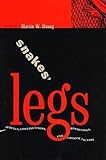Snakes' Legs : Sequels, Continuations, Rewritings, and Chinese Fiction / ed. by Martin W. Huang.
Material type: TextPublisher: Honolulu : University of Hawaii Press, [2004]Copyright date: ©2004Description: 1 online resource (320 p.)Content type:
TextPublisher: Honolulu : University of Hawaii Press, [2004]Copyright date: ©2004Description: 1 online resource (320 p.)Content type: - 9780824828127
- 9780824864330
- 895.1/3009
- PL2415 ǂb S63 2004eb
- online - DeGruyter
- Issued also in print.
| Item type | Current library | Call number | URL | Status | Notes | Barcode | |
|---|---|---|---|---|---|---|---|
 eBook
eBook
|
Biblioteca "Angelicum" Pont. Univ. S.Tommaso d'Aquino Nuvola online | online - DeGruyter (Browse shelf(Opens below)) | Online access | Not for loan (Accesso limitato) | Accesso per gli utenti autorizzati / Access for authorized users | (dgr)9780824864330 |
Frontmatter -- Contents -- Acknowledgments -- Introduction -- 1. Boundaries and Interpretations: Some Preliminary Thoughts on Xushu -- 2. Transformations of Monkey: Xiyou ji Sequels and the Inward Turn -- 3. In the Name of Correctness: Ding Yaokang's Xu Jin Ping Mei as a Reading of Jin Ping Mei -- 4. Eliminating Traumatic Antinomies: Sequels to Honglou meng -- 5. Honglou meng Sequels and Their Female Readers in Nineteenth- Century China -- 6. Growing from the Waist: The Problem of Sequeling in Yu Wanchun's Dangkou zhi -- 7. Rewriting the Tang: Humor, Heroics, and Imaginative Reading -- 8. Vindication of Patriarchy: Chen Tianchi's Ruyijun zhuan as a Critique of the Ming Ruyijin zhuan -- 9. The Voices of the Re-readers: Interpretations of Three Late-Qing Rewrites of Jinhua yuan -- 10. From Self-Vindication to Self-Celebration: The Autobiographical Journey in Lao Can youji and Its Sequel -- Glossary -- Bibliography -- Contributors -- Index
restricted access online access with authorization star
http://purl.org/coar/access_right/c_16ec
Snakes' Legs examines sequels (xushu), a common but long-neglected literary phenomenon in traditional China. What prompted writers to produce sequels despite their poor reputation as a genre? What motivated readers to read them? How should we characterize the nature of the relationship between sequels and rewritings? Contributors to this volume illuminate these and other questions, and the collection as a whole offers a comprehensive consideration of this vigorous genre while suggesting fascinating new directions for research. Xushu as a discursive practice reinforces the paradox that innovation is impossible without imitation. It presents us with fertile ground for studying the intricate ties that bind the writer and reader of traditional Chinese fiction: the writer of xushu is always self-consciously assuming the dual role of author and reader and in the writing process must consider both the work in progress as well as its precursor(s). Snakes' Legs contains detailed discussions of some representative xushu works from the late Ming and Qing periods, many of which have received little scholarly attention. It will shed light on the development of Chinese fiction and the various textual practices in traditional China as well as account for the genre's continuing vitality in modern times. Contributors: Robert E. Hegel, Siao-chen Hu, Martin W. Huang, Keith McMahon, Qiancheng Li, Ying Wang, Ellen Widmer, Laura H. Wu, Shuhui Yang.
Issued also in print.
Mode of access: Internet via World Wide Web.
In English.
Description based on online resource; title from PDF title page (publisher's Web site, viewed 02. Mrz 2022)


